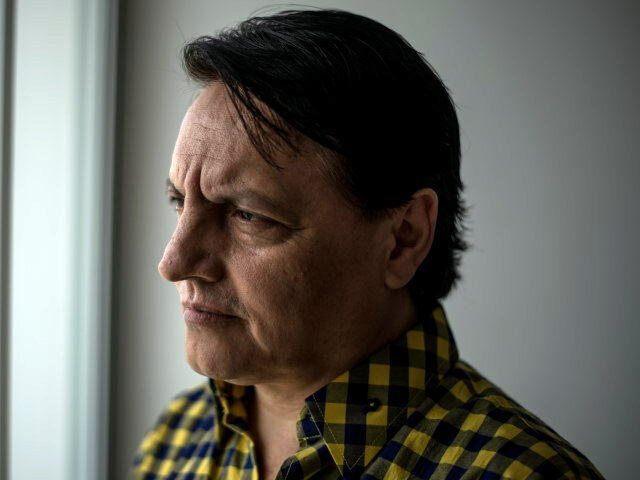Fernando Villavicencio, the Ecuadorian journalist and presidential candidate assassinated during a shootout on Wednesday, had a long history of anti-China and anti-socialist positions.
Villavicencio, who would have been on the ballot for the August 20 presidential race alongside seven other contenders, had for years denounced China’s growing influence and “colonization” of his country’s natural resources under the auspices of the socialist government of former President Rafael Correa. As a journalist, Villavicencio helped expose Correa’s vast graft network that ultimately led to the latter’s in absentia corruption conviction.
Villavicencio was shot dead on Wednesday as he was leaving a campaign rally in Quito 11 days before the first round of voting in Ecuador’s 2023 presidential election.
The 59-year-old presidential candidate for the center-right Construye movement was a fierce critic of China’s growing influence in his country, as well as a staunch denouncer of corruption and organized crime. As a lawmaker, he had taken leadership roles in multiple investigations into dubious socialist deals to gift Ecuadorian oil to China.
In October, Villavicencio asserted that “Ecuador has been a colony of China since 2007,” the year when Rafael Correa, a notorious anti-American socialist currently living in exile, began his first presidential term.
Villavicencio’s anti-China and anti-corruption activism was central to the theme of This Stolen Country of Mine, a 90-minute documentary produced in Germany and released in 2022 that exposed the growing and far-reaching Chinese influence in Ecuador that the Communist Party was able to attain through thousands of contracts signed during Correa’s presidency (2007-2017).
The contracts signed under Correa not only made Ecuador dependent on Chinese credit funds, but also gave China control of Ecuador’s mines, committed Ecuadorian oil to the Asian nation, and gave China influence over the country’s infrastructure and natural resources, including gold and uranium mines as well as technological infrastructure.
This Stolen Country of Mine follows the actions of eco-activist Paúl Jarrín Mosquera, who led the indigenous resistance against Chinese colonization and who tried to sabotage Chinese mining operations in Ecuador as Villavicencio exposed government corruption during Correa’s administration. In retaliation, Correa’s socialist government carried out a multi-year persecution campaign against Villavicencio that forced him to flee to save his life.
In 2014, Correa sentenced Villavicencio and two others to 18 months in prison for insulting him, a violation of their constitutional rights. Villavicencio was able to avoid serving jail time by seeking refuge in the indigenous community of Sarayaku, located in the south-central part of the Ecuadorian Amazon.
“The president wants me to get down on my knees and apologize,” Villavicencio said in an interview given to the Committee to Protect Journalists (CPJ) in 2014. “But I will never do that.”
Villavicencio, alongside Ecuadorian journalist Christian Zurita, exposed a vast corruption and bribery scandal commonly referred to as Arroz Verde (“Green Rice”) in which Correa and some of his government officials allegedly received bribes from businessmen between 2012 and 2016. Their work was instrumental in Correa’s conviction and eight-year in absentia prison sentence for corruption in 2020. Correa is currently living in Belgium, having fled to the European country with his wife, a Belgian national, in 2018.
Last year, as a lawmaker in the National Assembly, Villavicencio helped expose that Ecuador had lost nearly $5 billion in oil revenue between 2009 and 2016 as a result of Correa’s oil agreements with China that gave China access to preferential oil prices in exchange for loans.
As head of the Assembly oversight committee in charge of publishing a 200-page investigation on the matter, Villavicencio declared the findings “the greatest corruption scandal in the country’s oil history.”
In the last television interview he gave before being murdered, Villavicencio announced on Sunday that he would present an investigation before the nation’s Attorney General and the Comptroller General related to “the biggest oil robbery” in the history of Ecuador.
Villavicencio said that, during Correa and Vice President Jorge Glas’s administration, 21 oil fields that belonged to the state-owned Petroecuador oil company were handed over to foreign companies under service contracts.
“The evidence that I am going to present is so serious that videos have already been revealed between Jorge Glas and the former director of Hydrocarbons of the Regulation and Control Agency, José Luis Cortázar, in which Jorge Glas recognizes that there were no formulas to calculate and establish the tariffs,” Villavicencio told Ecuadorian journalist Carlos Vera.
“The great problem of this country, of our impoverishment, is corruption,” he continued. “Our country is a rich country. It does not lack money; it has plenty of thieves. Those who deal with the mafias are defeated and have their own funeral parlor in advance.”
In response to his investigations, Correa had repeatedly insulted and threatened Villavicencio in statements online. His most recent threat was published on Twitter in November.
“You are a shameless coward. Your party will soon be over,” Correa wrote.
Current Ecuadorian President Guillermo Lasso announced a 60-day state of emergency following Villavicencio’s murder. The state of emergency restricts certain rights, such as freedom of assembly, and the inviolability of the home and correspondence. The upcoming August 20 presidential election remains scheduled at press time.
Villavicencio’s murder occurred less than a month after Ecuador experienced a wave of violence in July that left several dead, including the mayor of Manta, Agustín Intriago, who was shot dead while carrying out an inspection of sewage works in one of Manta’s neighborhoods.
Christian K. Caruzo is a Venezuelan writer and documents life under socialism. You can follow him on Twitter here.

COMMENTS
Please let us know if you're having issues with commenting.